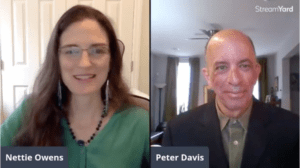Where should businesses be focusing their time right now?
One of the exercises that I do with CEOs when we start is getting focused on what they love to do in the business. And our goal is to get them to spend 50 to 60% of their time on things they love to do. It’s going to be different for everyone. But this exercise of thinking about where you are in your zone of genius and staying in there for as much time as is reasonable is really going to help you differentiate your business. It’s also going to help you feel better about the time you spend on general operational things because you know you’ve allowed enough time to be creative, get to your customers, and do the things you need to do.
“I often share something similar. It’s essential that you commit yourself to fill your cup by doing the things that you’re brilliant at – and that you enjoy. And so, when you do go to the operation side of it, it’s not taking away from that, and you have the energy from doing those activities that you enjoy because they’re the things that energize you first.”
Is this the time to be growing a business?
Folks often tell me, “I need to wait until school starts. I need to wait.” There’s always an “I need to wait” reason. So, if you feel like there’s always an “I need to wait” excuse, it’s time to pick something and start – even if it’s small. There will always be a reason that you can’t do the big thing, but there’s something small that you can do that will get you moving toward the bigger thing.
What are some small things that you can do to help get you moving towards the big things?
I would always talk to your clients and customers. It’s something that you can always do, especially as small businesses or self-funded businesses. It’s one of our great differentiators to have excellent customer service. So in terms of thinking about where we can grow, having conversations regularly with the people you work with will tell you what they’re interested in and the problems they need to solve.
What I’ve seen over the past 18 months with my clients is that they have continued to talk to their customers and say, “What can I help you with now?” – instead of saying, “This is what I do, What can I help you with?” That idea of being of service to the people you work with always brings an opportunity for growth because you’re partners in solving problems together. So regardless of what’s happening in the world, this creates problems to be solved. You can be a partner in problem-solving, and you will always have growth opportunities.
“One of the biggest things I’ve heard over these many interviews has just been the foundational aspect of relationship building. As a smaller business, relationship building happens directly with your customers. You have a big hand in that customer service and how the experience flows for that particular person or business you’re working with.”
When you’re growing, should you put money back into your business, or should you pay yourself?
When I work with a self-funded business, and by self-funded, it means that we’re not going to give up equity for money. We might use loans or other things. So when we think about growth versus pay, I believe that business owners need to plan to pay themselves. It can be a conservative amount. But if you are not planning on paying yourself from the start, you don’t build into the profitability that you need to have the correct pricing, so consider the right products or mix. Your economics will not be correct unless you consider how much you need to get paid as well. You’re underpricing your business, almost certainly, if you are not including paying yourself.
You can ultimately choose how to do that – and that’s the smart way to do that. But you need to plan from the beginning that you get paid something as the business owner, or else your economics will always be off.
“There’s also a mindset aspect to paying yourself. You will start resenting your business at some point because it’s not giving back to you in the same way that you’re putting into it.”
The amount you pay yourself is dependent on the person. We are all different in our businesses. I’m a single mom; I don’t have a choice but to pay myself what I need to pay myself. So, it’s very motivating to me to find what I need to do in this business to be able to pay my bills. Other people might be in a situation where they are not the primary income in the household, and there’s more flexibility in how you get paid.
But I think having some minimum committed amount that you pay yourself every month puts you in the mindset that there is a payroll to be met. And as your business grows and you have to start paying other people, it’s not a big shift for you. You’ve already had something that you have to pay out every month, and you have a plan for it. It’s a commitment to yourself.
I believe in paying yourself first. I know, that’s not how we normally think about it. But I think it’s one of those things that when you are a self-funded business, you have to think first of how you will get paid, and then balance out the expenses and the other investments that you make.
“If you can’t pay yourself, then there is that question of “Is this a business or is this a hobby?” And we certainly want you to be successful in business.”
3 Action Steps
- Spend 50%-60% of your time working on the things you love in your business so that you feel better when working on the general operations.
- Continue to ask your clients and customers, “What can I help you with now?” as a means of creating growth opportunities.
- Pay yourself as a means of keeping your business economics balanced.
Connect with ill James on LinkedIn or at The Jill James.
Please comment below. I would love to hear from you.














No comments yet.